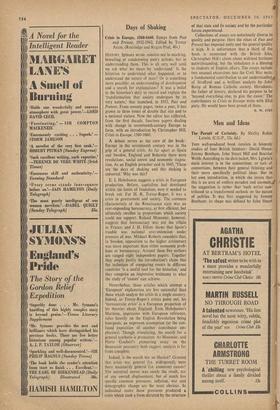Days of Shaking
Crisis in Europe, 1560-1660. Essays from Past and Present, 1952-1962. Edited by Trevor Aston. (Routledge and Kegan Paul, 40s.) HISTORY, Spinoza wrote, consists not in mocking, bewailing or condemning men's actions, but in understanding them. This is all very well until we ask what we mean by 'understand.' Is the historian to understand what happened, or to understand the nature of man? Or is something more possible; an understanding of development and a search for explanations? It was a belief in the historian's duty to record and explain the `transformation that society undergoes by its very nature,' that launched, in 1952, Past and Present. From seventy pages, twice a year, it has grown to three issues of double that size and to a national stature. Now the editor has collected, from the first decade, fourteen papers dealing with change in seventeenth-century Europe to form, with an introduction by Christopher Hill, Crisis in Europe, 1560-1660.
A debate serves as the core of the book: Europe in the seventeenth century was in the grip of a general crisis. As far apart as Spain and Sweden, England and Bohemia there were revolutions, social unrest and economic stagna- tion. As an English preacher said in 1643, 'These are the days of shaking and this shaking is universal.' Why was this?
E. J. Hobsbawm suggests a crisis in European production. Before, capitalism had developed within the limits of feudalism; now it needed to break out. For H. R. Trevor-Roper, it was a crisis in government and society. The common characteristic of the Renaissance state was an ever-expanding bureaucracy, at first efficient, but ultimately swollen to proportions which society could not support. Roland Mousnier, however, suggests that bureaucracy was not the villain in France, and J. H. Elliott shows that Spain's trouble was national over-extension under pressure of war. Michael Roberts considers that, in Sweden, opposition to the higher aristocracy was more important than either economic prob- lems or bureaucracy. Around these five authors are ranged eight independent papers. Together they amply justify the introduction's claim that the technique of comparing events in different countries `is a useful tool for the historian,' and they comprise an impressive testimony to what the study of 'causes' can achieve.
Nevertheless, those articles which attempt a 'European' explanation are less successful than those which analyse the crisis in a single country. Indeed, as Trevor-Roper's critics point out, his `bureaucratic crisis' is a European projection of his theories about England. Even HobsbaWm's Marxism, impressive with European reference, relies heavily on the English Revolution being bourgeois, an unproven assumption (as the con- fused exposition of another contributor em- phasises). Though stimulating, the search for a general synthesis is premature. As Mousnier, and Pierre Goubert's pioneering essay on the Beauvaisis peasantry both suggest, analysis is far from complete.
Indeed, is the search not an illusion? Granted that crisis was general (i.e. widespread), were there necessarily general (i.e. common) causes? The universal unrest was surely the result, not of any overall displacement, but of much less specific common pressures; inflation, war and demographic change are the most obvious. In individual states these pressures produced a crisis which took a form dictated by the structure of that state and its society and by the particular forces experienced.
Collections of essays are notoriously diverse in quality and purpose. Here the ethos of Past and Present has imposed unity and the general quality is high. It is unfortunate that a third of the book is concerned with the British Isles, Christopher Hill's claim about widened horizons notwithstanding, but the imbalance is a blessing to students of English affairs. The essays include two unusual excursions into the Civil War sects, a fundamental contribution to our. understandings of Strafford and a brilliant analysis by John Bossy of Roman Catholic society. Herodotus, the father of history, declared his purpose to be `beyond everything else, to give the cause.' The contributors to Crisis in Europe write with filial piety. He would have been proud of them.
E. W. IVES






































 Previous page
Previous page